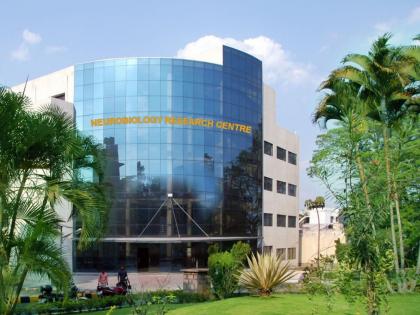The National Institute of Mental Health and Neurosciences Gets Its First HD Patient’s Brain for Research
By Anubha Jain | Updated: February 20, 2024 18:41 IST2024-02-20T18:39:29+5:302024-02-20T18:41:31+5:30
The National Institute of Mental Health and Neurosciences (NIMHANS) brain bank has received a 62-year-old Bengaluru-based Huntington’s Disease (HD) ...

The National Institute of Mental Health and Neurosciences Gets Its First HD Patient’s Brain for Research
The National Institute of Mental Health and Neurosciences (NIMHANS) brain bank has received a 62-year-old Bengaluru-based Huntington’s Disease (HD) female patient’s brain for research. The donor was the bank manager and wished to donate her brain as her last wish. Her son, an engineer by profession, approached NIMHANS for his mother’s brain donation. It’s the first such Huntington’s Disease brain donation. This gives a great fillip to HD research. The donor’s son said that until her last breath, his mother’s cognitive abilities were good. She had psychiatric issues but she had an idea about her bank account, the pension she was getting with other details. Huntington’s Disease (HD) is a neurological degenerative disorder that affects a patient’s ability to think, move and show their emotions. It can cause psychiatric issues.
Anita Mahadevan, HOD and Professor of neuropathology, NIMHANS in an interview with Lokmat Times representative Anubha Jain said, “Now we have actual brain and brain tissues to work with and to understand why anything is happening that leads us to a cure in the future. Before this brain donation everything like a blood sample, etc. was used to mirror what happened in the brain to understand the disease. We need normal brain donations as well that remain helpful to compare with. Animal models are not very effective for neurodegenerative diseases.” Anita informed that the deceased patient was brought in NIMHANS at 11 pm on Feb. 9th, 2024, and was operated on till past midnight. It took almost two hours to complete the procedure and handed the donor back to the family for the last rites.
Giving more insight about Huntington’s Disease, Sanjeev Jain, emeritus professor, Psychiatry Department, NIMHANS talked with Lokmat Times representative Anubha Jain, and said that there is no known treatment for this rare genetically transmitted disorder, and people suffering from this disease have untimely death. He said, "We don’t have any idea how many patients are suffering from this disorder in our country and also no treatment available for HD. The emotional consequences of the family relative being ill with this disease and where nothing can be done is very horrible. Like the other parts of the body, the delicate yet vital part of the body, i.e., the brain, we can’t do much or study it directly. This donation will help to understand HD more precisely and help with novel research work for a better cure and insight into the disease." Anita said, “Brain donation for research is significant. NIMHANS brain bank has been established since 1995 and the number of brains we receive for dementia or neurodegeneration is deficient. These patients die at home after a long illness. The donation depends on the patient and their families wanting to contribute to the neuroscience research and families are made aware of the availability of such facilities. That something hasn’t happened in a big way.” Doctors and researchers of NIMHANS are hopeful that this first case will open a pathway for many to come.
Open in app